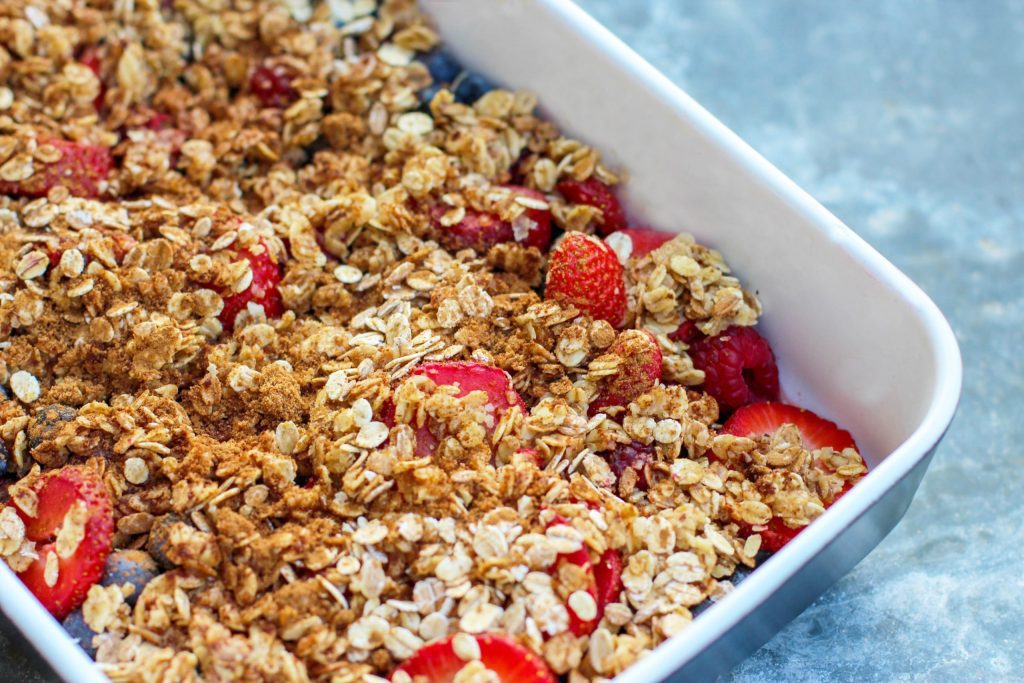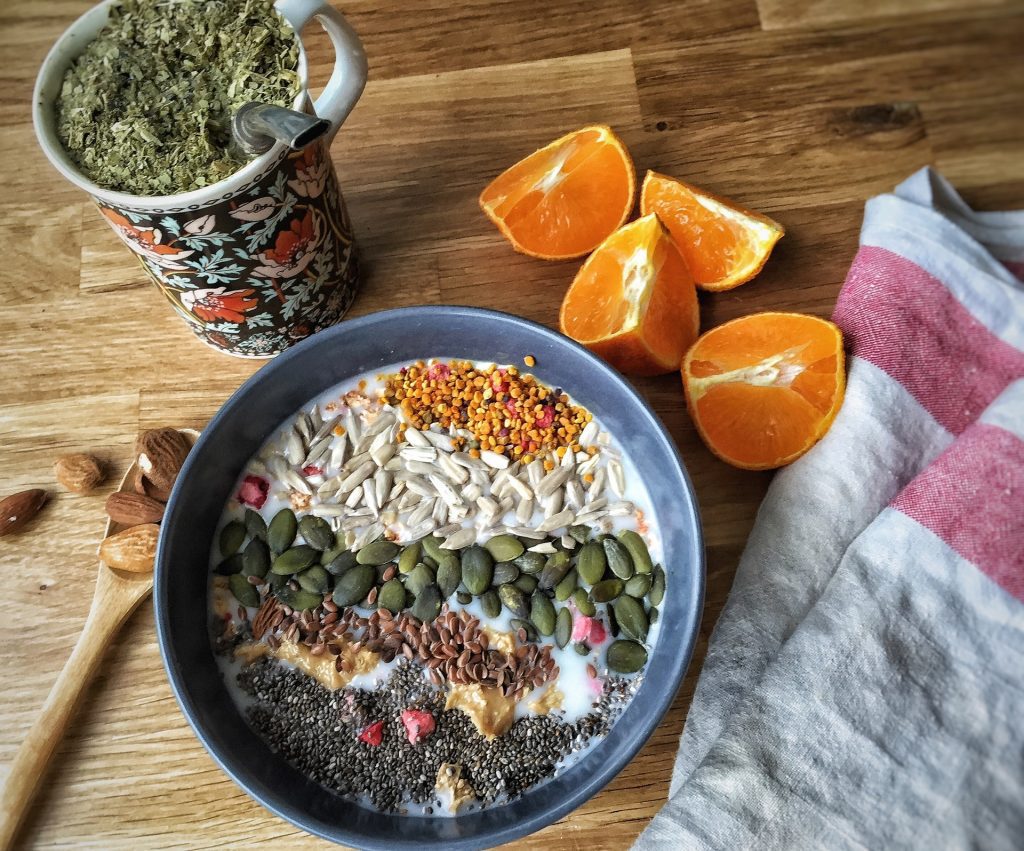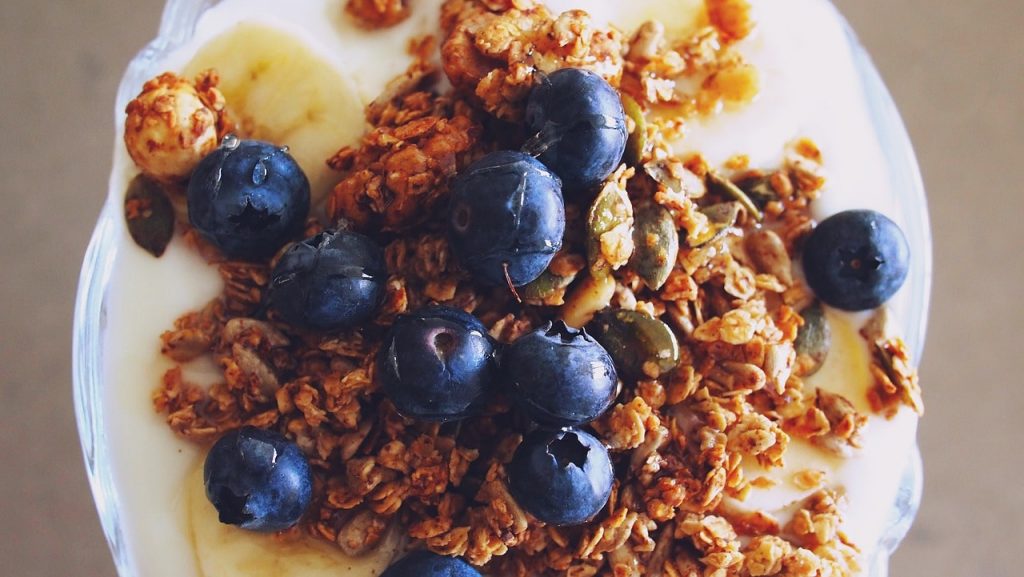Oats are naturally gluten-free and can be consumed by people who have an allergic reaction to gluten. Gluten is nothing but two proteins stuck together to forms a glue-like consistency. In fact, the word Gluten has its origins from the Latin word gluten which literally means glue. Oats are very healthy, and a wholesome food to have. Eating oats for breakfast is especially helpful, as it fills you up and helps in managing cravings throughout the rest of the day.
There are many ways to eat oats: Oats can be cooked and baked, which makes them one of the most versatile foods to experiment with. Oats can also be ground into flours, which in turn, can be used to cook pancakes, cakes, etc. Course oats’ flour can be used to create cookies and, even brownies.
Oats are most popularly cooked and consumed as porridge. Oats porridge is made by mixing oats and milk together in the pot and letting it boil for a few minutes until the porridge becomes thick. The thickness of the oats porridge is due to the absorption of milk by the oats. This makes the porridge very flavorful because when the oats absorb the milk, they achieve a tasty and delicious consistency. Oats and raisin cookies are a favorite for people of all ages because of their taste and texture. Oats pancakes are one of the best kinds of pancakes and can be deliciously paired with maple syrup, honey, and butter.
Related Reading:
Muesli vs. Granola: Which One Is The Healthier Breakfast Option?
Healthy Indian Breakfast Options For A Wholesome Day

Table of Contents
The Mystery Of Oats And Gluten
Oats is primarily a gluten-free food, which is very healthy and should be incorporated into one’s food to have a healthy lifestyle. People with celiac disease have a huge problem when it comes to food consumption because of their body’s intolerance to gluten. So, they have to be very sure that their food is totally gluten-free to avoid any health risks.
Some people want to include oats in their regular lifestyle because they are diagnosed with celiac disease or due to an increased awareness of healthy foods. However, oats contamination is one of the major problems faced by them in these cases. Oats contamination, as the name suggests, is the contamination of the oats with toxic substances such as gluten.
So, to put it simply, oats, per se do not have gluten. It is the contamination of oats, using other substances that may alter its natural, gluten-free nature.
Related Reading:
Benefits Of Oats| Health, Skin & Hair Benefits| Side-Effects| Recipes
How To Eat Oats: 7 Best Ways To Eat Oats
Types Of Oats: Steel Cut and Rolled Oats| What’s The Difference?
Types of Oats Contamination
Oats can be contaminated very easily by gluten in two ways. They can either get contaminated in the facility where they are processed or in the fields where they are grown. Oats get contaminated in the facility, or the processing unit, because the facility may process other foods like wheat and barley, which have gluten in them. This gluten may get transferred very easily to oats because of the close proximity of the grains. Even a tiny amount of gluten can be harmful to someone who suffers from Celiac disease. Another way in which oats can get contaminated is when they are grown in close proximity with wheat and barley crops. So, it is not surprising that the gluten from the wheat & barley crops spread to the oats crops as well.
The procurement of gluten-free oats is not a tedious task, as you might have thought. They are available almost everywhere for purchase. They are the most easily procurable and inexpensive gluten-free grain currently in the global market. Oats are one of the best and flexible grains to cook, because of their texture. They are the easiest to bake and cook because they need very little cooking time, thanks to their flaky texture. Oats are the best ingredient to make most of the baked goods when compared to other gluten-free flours. They are easy to work with when compared to potato starch and xanthan gum.

Not gluten sensitivity, after all!
Oats contamination is something that can be avoided by paying close attention to oats when they are grown and when they are being processed. However, some of the studies done regarding the contamination of the oats suggest the following. People, who are sensitive to gluten, but don’t have celiac disease, might not have a negative reaction to traces of gluten found in oats, but because of the FODMAP present in the oats.
FODMAP is a cluster of carbohydrates content found in a lot of foods. It stands for Fermentable Oligosaccharides, Disaccharides, Monosaccharides and Polyols. So, when you think you are sensitive to the gluten content in the oats, you aren’t actually sensitive to gluten, but to the FODMAP in the oats. This theory becomes even more believable when you aren’t diagnosed with celiac disease.
The FODMAP carbohydrates contain carbohydrates with lactose and fructose. Lactose and fructose are some of the carbohydrates that a lot of people find hard to digest, especially if they are intolerant to these carbs.
The FODMAP carbohydrate in oats that have been contaminated with gluten might be the cause of a disturbing reaction and not the little bit of gluten that the oats have been contaminated with. So, people who have gluten sensitivity can actually consume oats but have to check the FODMAP carbohydrate level in such oats to avoid any drastic reaction in their body. People with FODMAP carbohydrate sensitivity should discuss with their doctors before consuming foods that have these carbohydrates. And they are also not in danger of any reaction to the gluten content in the oats that have gluten because of contamination.
Related Reading:
Gluten-Free Diet: What To Eat & Avoid In A Gluten-Free Diet| 14 Gluten-Free Recipes

Gluten sensitivity doesn’t mean you have celiac disease
Many people around the world suffer from gluten sensitivity. This does not mean that they have celiac disease. Celiac disease is when gluten sensitivity is drastic and intolerable. To put it in a simple form, celiac disease is when the gluten intolerance is at its peak. Many people mistake one for the other because of a lack of information and knowledge. Gluten sensitivity can cause only a mild or in some cases even a less-painful reaction, whereas when a person has celiac disease, he might be having excruciating pain. In the worst-case scenarios, the person might need medical help to get rid of the pain or reduce the pain.
Is contamination the only problem that could come with oats?
Oats need not even be contaminated by gluten to be a problematic grain. The gluten contamination is just fuel to the already raging fire. People with celiac diseases may have wild reactions when they consume uncontaminated oats. This will leave a lot of people puzzled and in a confused state. The culprit here is not the gluten because uncontaminated oats seldom contain gluten.
The culprit here is a protein known as Avenin. Avenin is predominantly found in oats and has very similar properties to gluten. This protein activates the same immune cells that react to gluten, thereby creating a major reaction in people who have celiac diseases. The best option for people who have celiac disease is to stay clear of oats or any foods that contain avenin or gluten protein in it.
Points to remember when consuming oats
Oats is one of the most nutritious foods that have all the right nutrients that can constitute a healthy food. However, people with any allergic reactions should have a thorough consultation with their doctor before starting to incorporate oats into their everyday meals.
People who are trying to go on a gluten-free diet should also check the package of the oats to see if they are produced in a gluten-free environment so that they can be sure whether the oats contain any gluten or not.
Check the labels thoroughly and buy only gluten-free oats so that one can be safe than sorry. It is also important to test one’s sensitivity to avenin protein before buying gluten-free oats.
References
https://www.healthline.com/nutrition/gluten-in-oats#gluten-basics
https://www.medicalnewstoday.com/articles/317253.php#Are-oats-gluten-free
https://www.thekitchn.com/the-oat-conundrum-are-oats-glu-137074
FAQs
What varieties of oats are available in the market? Are all gluten free
There are various kinds of oats varieties that are available in the market. Here are some of the commonly known names-
Whole oats
Rolled oats
Steel cut oats
Instant oats
Oat bran
Oat flour
Oats are naturally gluten-free but their chances of getting contaminated in the field or during production is very high. Lots of oats are processed in equipment that also processes wheat and other gluten-containing grains. You should therefore make sure to buy produced and tested gluten-free oats. If your bag of oats doesn’t specifically say gluten-free on it, then it is not gluten-free.Can I bake with oat flour?
Oat flour can be used in all sorts of recipes from pancakes and waffles, to muffins and breads, to cakes and cookies. Many recipes are formulated for oat flour, but if a recipe calls for all purpose flour then you can substitute oat flour for up to 25-30% the amount of regular flour in most baking recipes.
What is the difference between Celiac Disease and Gluten Intolerance?
Celiac disease is an autoimmune disorder that causes individuals to negatively respond to gluten, a protein found in wheat, barley, and rye. Over time, as gluten triggers immune responses, the small intestine’s lining becomes damaged. Without a diagnosis and appropriate treatment, it is likely that individuals with celiac disease will suffer from malabsorption, the inability for the small intestine to absorb nutrients into the bloodstream. If you are diagnosed with celiac disease, the most effective way to manage the symptoms is to completely cut gluten from your diet.
Gluten intolerance, also known as non-celiac gluten sensitivity, has similar symptoms to celiac disease. Although both conditions cause the body to have a negative response to gluten, the two types of responses do not have the same longevity or consequence. When a celiac person ingests gluten, his or her immune system will attack against its own body’s tissue. Whereas, if a person is gluten intolerant, the consumption of gluten will cause short-term bloating and belly pain. Unlike celiac disease, gluten intolerance doesn’t usually cause long-term harm to the body.
Symptoms of Celiac disease vs Symptoms of Gluten Intolerance?
There are many common signs of celiac disease that are directly related to the body’s inability to properly digest food. These include:
Diarrhoea
Weight loss
Bloating and gas
Abdominal pains
Constipation
Vomiting
There are also signs that you may not originally associate with celiac disease since they are not directly related to the digestive system. These other symptoms of celiac disease can include:
Itchy skin
Headaches and fatigue
Bone and joint pain
Acid reflux and heartburn
Mouth ulcers
Seizures
There are many symptoms of gluten intolerance, most of which are gastrointestinal symptoms. If you see some of these signs after eating foods with gluten, it is possible that you may be gluten intolerant. Some common signs of gluten intolerance include:
Diarrhoea
Fatigue
Bloating
Stomach ache
Nausea
Gas
Constipation
Like celiac disease, there are other signs that may not commonly be associated with gluten intolerance. These symptoms include:
More severe stomach pain (not just an upset belly). This type of pain is not normal and may require medical attention.
Headache
Joint and muscle pain
ConfusionWhat are some of the other gluten free grains available in the market?
Other commonly available gluten free grains are-
Amaranth
Arrowroot
Buckwheat
Cassava
Millet
Quinoa
Rice
Sorghum
Soy
TapiocaWhy is gluten free diet gaining so much popularity?
The past decade has witnessed an increase in the prevalence of both clinically-diagnosed celiac disease and gluten-sensitivity due to expanded awareness of the symptoms, hence making people shift to a gluten free diet. But lately, it seems that even people without the condition or symptoms are moving toward a preference for gluten-free foods. This dietary shift has been attributed to studies that claim avoiding gluten can have significant benefits for the average person, such as weight loss and reduced risk of cardiovascular disease.
But doctors suggest that if you have not been diagnosed with celiac disease or gluten intolerance, you should typically not give up on gluten rich foods, as they contain many essential nutrients like vitamins, iron and carbohydrates, that is required to maintain a healthy body with ample energy levels.


